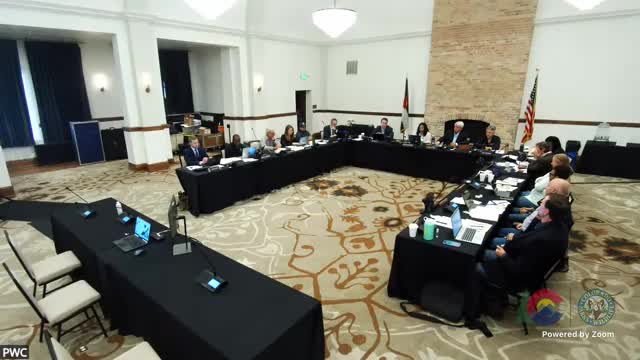CPW stresses lethal removal policy after Copper Creek depredations; commissioners press for review of translocation protocol
Get AI-powered insights, summaries, and transcripts
Subscribe
Summary
Director Davis told the commission that on May 29 CPW lethally removed a yearling male wolf from the Copper Creek pack after confirming four livestock depredations; staff said the removal met the agency's chronic‑depredation standard and that translocation survival figures will prompt a protocol review.
The Colorado Parks and Wildlife Commission heard a detailed update on wolf management June 11 as staff defended a lethal removal and said translocation survivorship figures will trigger a formal protocol review.
Director Davis told the commission that on May 29 CPW "lethally removed grama wolf 2405," a yearling male from the Copper Creek pack, after investigators confirmed four depredation events between May 17 and May 25, including three the agency characterized as "clear and convincing evidence." The removal followed CPW's chronic‑depredation standard described in the meeting: three depredations within 30 days, at least one meeting the clear‑and‑convincing threshold.
Why it matters: commissioners and producers pressed staff for more rapid, transparent field coordination as ranchers in the area reported repeated losses. Staff said they had deployed range riders and worked directly with ranchers, but several commissioners and producers said more rapid and direct notification or on‑the‑ground coverage is still needed.
What staff said
- Director Davis: "We don't take those removals lightly," and he framed the agency's action as intended to alter pack social behavior and reduce future depredations.
- CPW area staff described how the agency investigates depredations and said investigations are prioritized for timeliness; the agency also said it has limited but active range‑rider coverage in the affected area.
- Assistant Director Brian Dreyer and others reported translocation outcomes: commissioners heard that five wolves from the cohort translocated from British Columbia have died since release. The commission's management plan sets a protocol review if survival falls below 70 percent within six months of release; speakers in the meeting also used the figure "67 percent" when discussing the current status, and meeting remarks were inconsistent about whether 67 percent referred to survival or to mortality (see clarifying details).
Commissioner concerns and public contact
Commissioners pressed CPW on three operational fronts: 1) whether producers had used nonlethal deterrence (staff and producers said they had), 2) whether the agency's range‑rider staffing was sufficient and deployed rapidly enough (staff said two CPW contract range riders were working in the immediate area and that some producers had hired private riders with grant support), and 3) whether diversionary feeding would reduce depredations (staff said diversionary feeding is being evaluated but that wolves remain hunting predators with caloric needs that often drive lethal predation).
Area wildlife manager Matt Yamashita described daily communications between staff and landowners and said CPW was "making an effort" to refine the range‑rider program. He also noted that limited cell coverage in some allotments complicates rapid text‑style alerts to producers; Commissioners suggested multi‑channel notification (phone, text, in‑person) for producers in affected allotments.
Rulemaking and potential commission resolution
Chair May read a draft resolution (Resolution 25‑01) that would express commission support for the Colorado Department of Natural Resources' May 13, 2025 comment letter urging the U.S. Fish and Wildlife Service to withdraw a proposed rule that would rescind the Services' regulatory definition of "harm" under the Endangered Species Act. Chair May said the commission would revisit that draft resolution the next morning for possible adoption; no action was taken at the June 11 session.
What is next
CPW staff said the agency would post a final report on the recent lethal removal and associated investigative details (the agency said it expected to post that report no later than the Monday after the meeting). The translocation review required by the wolf plan will proceed if survivorship demonstrates the pre‑set trigger is met. Commissioners asked staff to improve field notification and to continue refining range‑rider deployment and diversion‑feeding options.
Ending
The commission's discussion highlighted friction between producers and wildlife managers about on‑the‑ground coordination during a period of recurring depredations. CPW staff repeated that their operational decisions are guided by the adopted wolf management plan and that the agency seeks to balance producer protections with the statutory directive to restore and manage recovered species.
